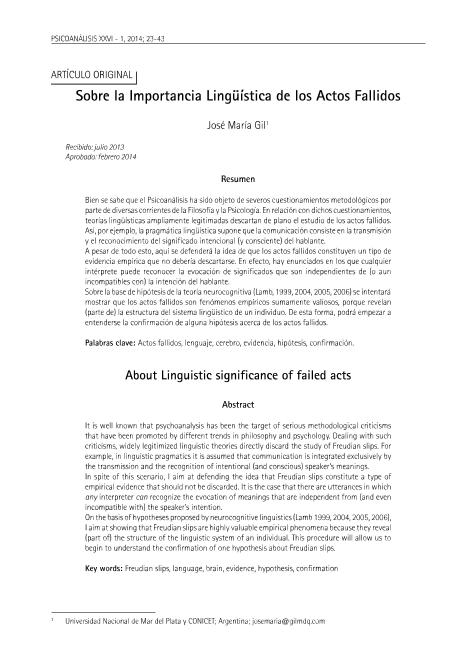Mostrar el registro sencillo del ítem
dc.contributor.author
Gil, Jose Maria

dc.date.available
2018-02-02T19:56:56Z
dc.date.issued
2014-08
dc.identifier.citation
Gil, Jose Maria; Sobre la Importancia Lingüística de los Actos Fallidos; Asociación Psicoanalítica Colombiana; Psicoanálisis; XXVI; 2; 8-2014; 23-43
dc.identifier.issn
0120-1093
dc.identifier.uri
http://hdl.handle.net/11336/35554
dc.description.abstract
Bien se sabe que el Psicoanálisis ha sido objeto de severos cuestionamientos metodológicos por parte de diversas corrientes de la Filosofía y la Psicología. En relación con dichos cuestionamientos, teorías lingüísticas ampliamente legitimadas descartan de plano el estudio de los actos fallidos. Así, por ejemplo, la pragmática lingüística supone que la comunicación consiste en la transmisión y el reconocimiento del significado intencional (y consciente) del hablante. A pesar de todo esto, aquí se defenderá la idea de que los actos fallidos constituyen un tipo de evidencia empírica que no debería descartarse. En efecto, hay enunciados en los que cualquier intérprete puede reconocer la evocación de significados que son independientes de (o aun incompatibles con) la intención del hablante. Sobre la base de hipótesis de la teoría neurocognitiva (Lamb, 1999, 2004, 2005, 2006) se intentará mostrar que los actos fallidos son fenómenos empíricos sumamente valiosos, porque revelan (parte de) la estructura del sistema lingüístico de un individuo. De esta forma, podrá empezar a entenderse la confirmación de alguna hipótesis acerca de los actos fallidos.
dc.description.abstract
It is well known that psychoanalysis has been the target of serious methodological criticisms that have been promoted by different trends in philosophy and psychology. Dealing with such criticisms, widely legitimized linguistic theories directly discard the study of Freudian slips. For example, in linguistic pragmatics it is assumed that communication is integrated exclusively by the transmission and the recognition of intentional (and conscious) speaker’s meanings. In spite of this scenario, I aim at defending the idea that Freudian slips constitute a type of empirical evidence that should not be discarded. It is the case that there are utterances in which any interpreter can recognize the evocation of meanings that are independent from (and even incompatible with) the speaker’s intention. On the basis of hypotheses proposed by neurocognitive linguistics (Lamb 1999, 2004, 2005, 2006), I aim at showing that Freudian slips are highly valuable empirical phenomena because they reveal (part of) the structure of the linguistic system of an individual. This procedure will allow us to begin to understand the confirmation of one hypothesis about Freudian slips.
dc.format
application/pdf
dc.language.iso
spa
dc.publisher
Asociación Psicoanalítica Colombiana
dc.rights
info:eu-repo/semantics/openAccess
dc.rights.uri
https://creativecommons.org/licenses/by-nc-sa/2.5/ar/
dc.subject
Lenguaje
dc.subject
Cerebro
dc.subject
Evidencia
dc.subject
Actos Fallidos
dc.subject.classification
Estudios Religiosos

dc.subject.classification
Filosofía, Ética y Religión

dc.subject.classification
HUMANIDADES

dc.title
Sobre la Importancia Lingüística de los Actos Fallidos
dc.title
About Linguistic significance of failed acts
dc.type
info:eu-repo/semantics/article
dc.type
info:ar-repo/semantics/artículo
dc.type
info:eu-repo/semantics/publishedVersion
dc.date.updated
2018-01-26T18:56:23Z
dc.journal.volume
XXVI
dc.journal.number
2
dc.journal.pagination
23-43
dc.journal.pais
Colombia

dc.journal.ciudad
Bogotá
dc.description.fil
Fil: Gil, Jose Maria. Universidad Nacional de Mar del Plata; Argentina. Consejo Nacional de Investigaciones Científicas y Técnicas; Argentina
dc.journal.title
Psicoanálisis
dc.relation.alternativeid
info:eu-repo/semantics/altIdentifier/url/http://www.asociacionpsicoanaliticacolombiana.org.co/revista/volumenesrevista.html
dc.relation.alternativeid
info:eu-repo/semantics/altIdentifier/url/https://issuu.com/revistapsicoanalisis9/docs/5459_revista_psicoana__lisis_ene_14
Archivos asociados
